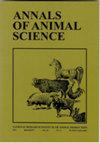Cell-based meat labeling – current worldwide legislation status
IF 2.2
4区 农林科学
Q2 AGRICULTURE, DAIRY & ANIMAL SCIENCE
引用次数: 0
Abstract
Abstract A growing interest has been noted if both industry operatives and consumers in cell-based meat (CBM), as visible in the increasing investment into this technology by major food industry corporations. However, in almost all countries worldwide, there is a lack of clear legislation with regard to the labeling of such products. The aim of the article is to collect and review current legal regulations concerning the international approval and labeling these types of products. In the manuscript, we reviews and analyze the legal situation of CBM and its labelling in countries from 4 different continents (EU members, the UK, the USA, Canada, Australia and New Zealand, Japan, Singapore and Israel). Aside from Singapore, no other country has approved CBM for placement on the market. The US has reached an agreement and established regulatory frameworks on CBM matters, where both the USDA and the FDA will be the control institutions. Within the European Union, CBM products will be evaluated under the Novel Food Regulation. The most anticipated process in other countries is the evaluation of CBM under the legislation on novel foods and subsequent amendments. Since local laws are still being developed, special care should be taken by the policymakers to avoid implementing local laws which could cause a negative approach to the technology by the consumers.基于细胞的肉类标签——当前全球立法现状
工业操作者和消费者对细胞肉(CBM)越来越感兴趣,主要食品工业公司对这项技术的投资不断增加。然而,世界上几乎所有国家都缺乏关于这类产品标签的明确立法。本文的目的是收集和审查目前有关国际批准和标签这些类型的产品的法律法规。在手稿中,我们回顾和分析了四大洲国家(欧盟成员国、英国、美国、加拿大、澳大利亚和新西兰、日本、新加坡和以色列)CBM及其标签的法律状况。除新加坡外,没有其他国家批准CBM上市。美国已经就信任措施问题达成了协议,并建立了监管框架,其中美国农业部和FDA都将是控制机构。在欧盟内部,CBM产品将根据新食品法规进行评估。在其他国家,最值得期待的过程是根据新食品立法和随后的修正案对CBM进行评估。由于当地法律仍在制定中,政策制定者应特别注意避免执行可能导致消费者对技术采取消极态度的当地法律。
本文章由计算机程序翻译,如有差异,请以英文原文为准。
求助全文
约1分钟内获得全文
求助全文
来源期刊

Annals of Animal Science
农林科学-奶制品与动物科学
CiteScore
4.00
自引率
5.30%
发文量
138
审稿时长
6-12 weeks
期刊介绍:
Annals of Animal Science accepts original papers and reviews from the different topics of animal science: genetic and farm animal breeding, the biology, physiology and reproduction of animals, animal nutrition and feedstuffs, environment, hygiene and animal production technology, quality of animal origin products, economics and the organization of animal production.
 求助内容:
求助内容: 应助结果提醒方式:
应助结果提醒方式:


